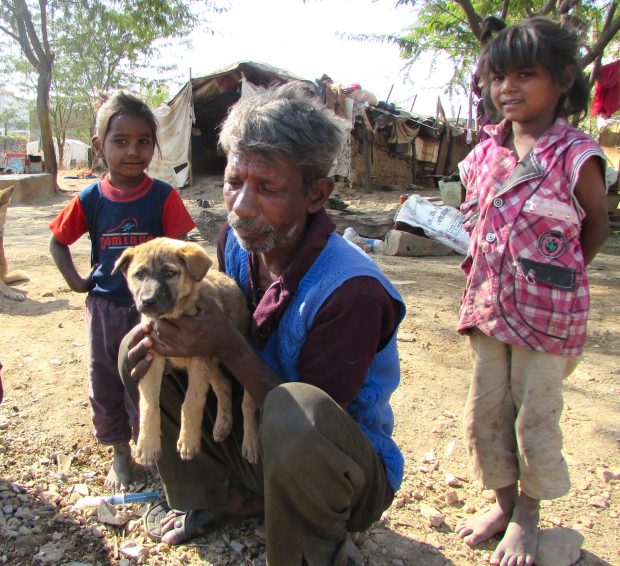by Lisa Warden
Published in Between the Species, issue 25 (1), 2022 (Link to full article)
Abstract:
Caste, class, race, and species collide in this narrative nonfiction piece about an injured street dog, his foreign rescuer, and her Dalit housekeeper in Ahmedabad, India.
Chapter 1:
I saw him first in the spring, lying by the road as we drove through the outskirts of the arid village of Jagatpur in western India. Jagatpur stood like a speed bump between nearby Ahmedabad’s urban sprawl and the outer state highway that circumnavigated the city. A few single-storey dwellings, once various shades of ochre and pistachio but now dulled to dun, spilled across the road onto the dry plateau south of the village. The Gujarati plains blanched in the furnace of the pre-monsoon heat as it approached its peak, parching life out of the earth and turning the landscape a depleted shade of beige. The emaciated mass lay motionless in the dirt a few yards from the road, a coat of filthy brown fur stretched taut over ridges of spine and angles of pelvis. As we drove by, I wondered how long the dead dog had been there lying in a heap on the roadside.
The road lay along the route to a college where I’d enrolled in a course. On my way to class the next day I caught sight of the twisted carcass again, this time further down the road, dragged there, I assumed, by a predator. It wasn’t unusual to see dead and maimed dogs in India. Free-living dogs abounded in Indian cities. A census in Ahmedabad put their number at around 200,000 (Humane Society International, 2010). The urban spaces were also choked with hurtling cars, buses, trucks, motorcycles, and auto rickshaws. When the latter collided with the former, it was generally the dogs who suffered the consequences. In Jagatpur, where there were fewer people, there were fewer dogs and less traffic.
“Hey Mukesh,” I said to the driver, “can you please pull over? Just here, by the chai stand.” We were on our way to class again. I’d spotted a scrawny puppy near the roadside tea stall in Jagatpur and wanted to stop and feed him.

The makeshift kiosk, more a large cupboard than a shop, brimmed with brightly coloured packets of tea biscuits, paan— the Indian equivalent of chewing tobacco, made from betel nut—and other mysterious snacks hanging from the narrow beams that supported the rickety roof. The oily-haired chai wallah hovered over a battered aluminum pot simmering on a propane stove. Waves of cardamom, ginger, and sweat hit me as I gestured to the Parle G tea biscuits on the shelf behind him and asked for three packets. “Teen packet deejiye.”
Parle G biscuits, a common snack among everyone from students to labourers to business people and truck drivers, were cheap and available at every roadside tea stall in India. They were also the de facto Indian street dog snack and befriending tool. Biscuits in hand, I made my way toward the pup, squatted down a few paces away, and opened one of the packets. Alerted by the crinkling of the wrapper, he looked over and eyed me expectantly. I broke off a piece and lobbed it gently in his direction. He got up and gulped it down. I tossed him some more, each time a little closer by. Soon he was right beside me, happily eating cookies while I stroked his tawny head.
As I played with the pup, I heard the rustle of something dragging through the dirt off to my right. I turned to look and stared, astonished. The crumpled canine heap I’d taken for dead was straining to pull himself over to me—or, rather, to the biscuits I was feeding the puppy. I could see he’d been run over. His back appeared broken, his hind legs limp and dragging useless behind him. He was jarringly thin and caked with mud, dried blood, and excrement. The front edges of his back legs were bloody, rubbed raw from constant dragging over the rough ground. His spine, ribs, and hipbones jutted out from his skeletal frame. I couldn’t believe he was still alive, let alone able to make it over to me. He devoured the rest of the biscuits as I dropped them in pieces on the ground at my feet, along with a leftover granola bar and some crackers I retrieved from the car.
I only had a few classes left, but on each occasion over the next ten days I brought the broken dog a full meal and plenty of water. “Crumplestiltskin,” as I initially called him, did not seem friendly. He wasn’t aggressive towards me, but neither did he display any overt signs of warmth or appreciation, other than scarfing down the food I offered as quickly and desperately as possible.
Remarkable only for its dusty bleakness, the edge of Jagatpur always appeared deserted until we showed up. We’d pull over and get out of the car, then, seemingly out of nowhere, a handful of curious onlookers would trickle out and converge, forming a circle around us, staring intently while I fed the dog. I wished I could speak Gujarati.
“Mukesh, can you ask them what happened to this dog? How long has he been like this?”
A round of chatter ensued. One woman, sinewy and sun- darkened, spoke the most, and the loudest.
“She say one week, madam,” said Mukesh.
She clearly said a lot more than that, but my lack of language skills precluded me from further details…..
[… Continue reading at Link to full article ]
Piccolo’s life and mine became intricately linked. This lovely, living, breathing creature—with his own personality and quirks and preferences—he was so fragile, so vulnerable, and yet so determined to hang on…. Had Piccolo and I not met, had he perished out there on the roadway, that he had ever existed at all might not have mattered to anyone. This was incomprehensible to me. He was an entire universe all his own. He mattered. Period.
